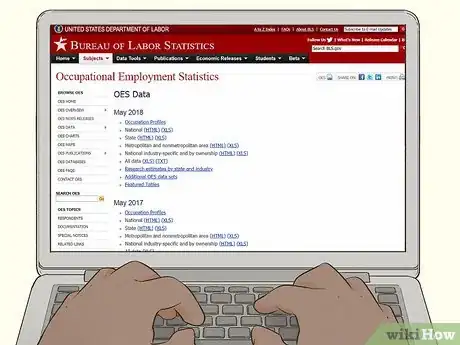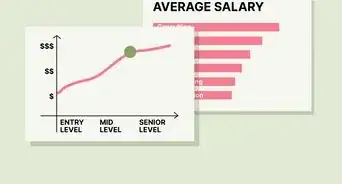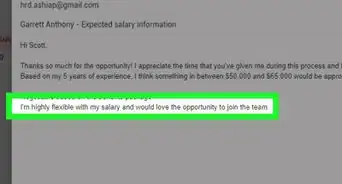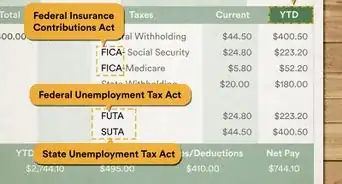This article was co-authored by Jonathan Soormaghen. Jonathan Soormaghen is a Career Coach and Founder of Resume Advisor, a career counseling firm that specializes in creating personalized products such as resumes, CVs, cover letters, and online branding tools to propel clients toward their next career milestone. Jonathan holds a BA in Political Economy from the University of California, Berkeley, where he was honored to serve as the Valedictory speaker of general commencement. Prior to founding Resume Advisor, he worked in management consulting and finance at companies including Accenture, Target, and Ernst & Young. Jonathan's clients have landed job offers from leading firms including Netflix, Google, Microsoft, Amazon, Facebook, Apple, Uber, Deloitte, KMPG, Accenture, and Merrill Lynch.
There are 7 references cited in this article, which can be found at the bottom of the page.
This article has been viewed 42,823 times.
It’s totally normal to feel awkward bringing up salary with a potential employer, but it doesn’t have to be an uncomfortable conversation. Asking about salary isn't rude! You have the right to ask questions about the salary of a job you’re interested in and negotiate if you think you deserve more. If you’re not sure how to go about it, don’t worry. This article will walk you through how to politely bring up salary and give you tips on how to ask for more money if you want to.
Steps
Practicing Your Negotiation
-
1Gather information about what people in similar positions earn. Doing research will allow you to see the typical salary for a position like yours.[1] This information will help you defend your request for a higher salary.[2]
- In the United States, the Bureau of Labor Statistics also maintains a detailed salary database that is broken down by region and profession: https://stats.bls.gov/oes/tables.htm.
- Narrow down the typical salary range by your geographic location, years of experience, education level, and verifiable skills by clicking on your specific profession and scrolling through the available data.[3]
-
2Phrase the question so you sound confident and natural. It's completely normal to feel nervous about bringing up the issue of salary. You can ease some of this nervousness by preparing and practicing the question ahead of time.[4]
- Asking directly about salary is one way you can demonstrate to the interviewer that you have the confidence and communication skills to thrive in the position for which you're applying.
- You could say, “What is the expected salary for this position?” or "How much can I expect to earn per year in this role?"
Advertisement -
3Role play with a friend or family member to practice negotiating. Practicing a salary negotiation will help build up your confidence. Your friend or family member will also be able to give you valuable feedback on your negotiating style.[5]
- If you don't feel comfortable practicing with someone else, try practicing in front of a mirror.
- As you practice, try to anticipate the hiring manager's responses to your request.
Discussing Salary with a Potential Employer
-
1Ask about salary as soon as possible so you don't waste your time. Ask about the salary range of a job either when you first talk to a recruiter or during your first interview. If you don't bring up the issue of salary early in the process, you may not find out what the job pays until you're offered the position.[6]
- A good time to bring up the issue of salary is when the interviewer asks you if you have any questions for them.
- If you're unwilling to accept an annual salary below a certain amount, you should make that clear early in the process, so you and the recruiter are on the same page.
-
2Raise the issue using simple and direct language. While asking a friend or a neighbor their salary might be rude in many cultures, asking about the salary range of a job for which you're applying is not. Most recruiters and hiring managers expect to be asked this question. “What is the salary range for this position?” is one way to phrase this difficult question.[7]
-
3Try to avoid discussing your current or past salary. During the interview process, an interviewer may ask you how much you're earning at your current position. You should try to avoid giving them a direct answer because if your current salary is considerably lower than the position's average salary, the hiring manager may lower their initial salary offer. Instead, try to deflect the question by telling the interviewer your salary expectations.[8]
- For example, in response to a question like: “What is your current salary?” politely avoid answering by saying something like: “I'm looking for a job that pays somewhere in the range of $40,000-45,000 per year.”[9]
- If an interviewer continues to pry into your personal financial situation, that could be a sign that the company doesn't value the privacy of its employees, and you may want to consider applying to a different company.
-
4Bring up a number without making it seem like a request. If someone with your level of education and experience typically makes between $55,000 and $60,000 in positions like the one you're applying to, you could say something like: “According to my research, I've discovered that people with my level of experience typically make between $60,000 and $65,000.”[10] Bringing up this slightly higher salary range puts the higher number in the hiring manager's mind without making it seem like a direct request from you.[11]
-
5Cite a higher competing offer to justify your request if you've received one. When you counter a company's starting salary offer with a higher number of your own, the interviewer or hiring manager may ask you why. If you received a higher offer from another company, let the hiring manager know this so that your request seems reasonable.[12]
- If more than 1 company is trying to hire you at a time, don't be afraid to raise your salary expectations. If one company won't offer you a higher salary, you can always choose the competing offer.
- If you don't have a competing offer from another company, you can refer to publicly available information to negotiate a better offer.
-
6Ask about alternative benefits if higher wages aren't offered. Even if your employer is unable to offer you a higher salary, they may be able to provide you with other benefits. A more flexible work schedule, more vacation days, or stock options may be up for negotiation.[13]
- For example, you could say something like: “Since a higher salary isn't an option, would it be possible to occasionally telecommute?”
- If your employer does offer you these concessions, be sure to take some time to consider their offer before agreeing to it. Compare the value of these benefits to your salary request and determine whether the trade-off is worth it.
- While the monetary value of an extra 5 days of vacation time might be considerably less than an extra $2,000 tacked onto your annual salary, the added flexibility might make up the difference, depending on your situation.
-
7Thank the employer regardless of whether you accept the offer.[14] After negotiating a salary, it's important to be polite and thank the employer irrespective of the negotiation's outcome. If you're not able to get the salary you want but decide to work for the employer anyway, being polite will help maintain a positive relationship. If you decide to decline the offer, parting on good terms will leave a favorable impression, and may put you in the running for a future, even better opportunity at the company.[15]
Expert Q&A
Did you know you can get expert answers for this article?
Unlock expert answers by supporting wikiHow
-
QuestionHow should you politely ask about salary in a job interview?
 Jonathan SoormaghenJonathan Soormaghen is a Career Coach and Founder of Resume Advisor, a career counseling firm that specializes in creating personalized products such as resumes, CVs, cover letters, and online branding tools to propel clients toward their next career milestone. Jonathan holds a BA in Political Economy from the University of California, Berkeley, where he was honored to serve as the Valedictory speaker of general commencement. Prior to founding Resume Advisor, he worked in management consulting and finance at companies including Accenture, Target, and Ernst & Young. Jonathan's clients have landed job offers from leading firms including Netflix, Google, Microsoft, Amazon, Facebook, Apple, Uber, Deloitte, KMPG, Accenture, and Merrill Lynch.
Jonathan SoormaghenJonathan Soormaghen is a Career Coach and Founder of Resume Advisor, a career counseling firm that specializes in creating personalized products such as resumes, CVs, cover letters, and online branding tools to propel clients toward their next career milestone. Jonathan holds a BA in Political Economy from the University of California, Berkeley, where he was honored to serve as the Valedictory speaker of general commencement. Prior to founding Resume Advisor, he worked in management consulting and finance at companies including Accenture, Target, and Ernst & Young. Jonathan's clients have landed job offers from leading firms including Netflix, Google, Microsoft, Amazon, Facebook, Apple, Uber, Deloitte, KMPG, Accenture, and Merrill Lynch.
Career Coach
References
- ↑ Jonathan Soormaghen. Career Coach. Expert Interview. 7 October 2020.
- ↑ https://www.forbes.com/sites/nextavenue/2014/05/14/how-to-research-salaries-when-job-hunting/#bc1cc1377ae5
- ↑ https://stats.bls.gov/oes/tables.htm
- ↑ https://www.forbes.com/sites/lizryan/2017/05/19/whats-the-salary-range-for-this-job/#6a8e649773c5
- ↑ https://www.pon.harvard.edu/daily/salary-negotiations/negotiate-salary-3-winning-strategies/
- ↑ https://www.forbes.com/sites/lizryan/2017/05/19/whats-the-salary-range-for-this-job/#5ee8cb6573c5
- ↑ https://www.forbes.com/sites/lizryan/2017/05/19/whats-the-salary-range-for-this-job/#6a8e649773c5
- ↑ https://www.forbes.com/sites/lizryan/2017/05/19/whats-the-salary-range-for-this-job/#6a8e649773c5
- ↑ Jonathan Soormaghen. Career Coach. Expert Interview. 7 October 2020.
- ↑ Jonathan Soormaghen. Career Coach. Expert Interview. 7 October 2020.
- ↑ https://www.pon.harvard.edu/daily/salary-negotiations/negotiate-salary-3-winning-strategies/
- ↑ https://www.forbes.com/sites/lizryan/2018/02/11/ten-things-never-ever-to-say-in-a-salary-negotiation/#49bdc6df435c
- ↑ https://www.pon.harvard.edu/daily/salary-negotiations/negotiate-salary-3-winning-strategies/
- ↑ Jonathan Soormaghen. Career Coach. Expert Interview. 7 October 2020.
- ↑ https://www.pon.harvard.edu/daily/salary-negotiations/negotiate-salary-3-winning-strategies/



































































